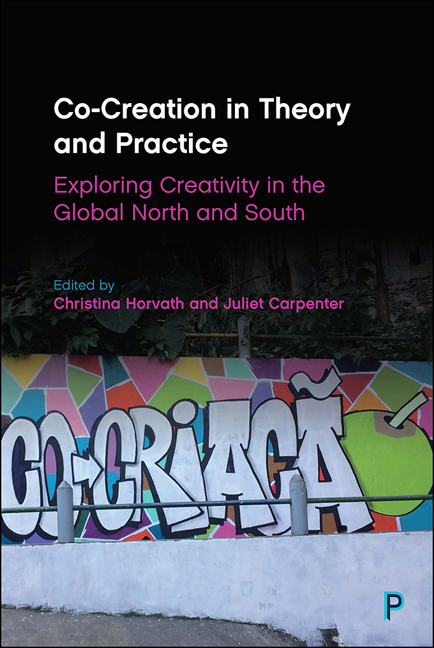4 - Global North-South Tensions in International Co-Creation Projects
Published online by Cambridge University Press: 18 March 2021
Summary
Introduction
Co-Creation as a collaborative approach to knowledge production brings together a diverse range of participants and uses art to drive out knowledge and challenge existing hierarchies and preconceptions. While some Co-Creation practices can remain entirely local, many involve North-South encounters either occurring between participants of international workshops or taking the form of conflicts between different traditions of knowledge production specific to the ‘Global North’ and the ‘Global South’. In addition, hegemonic representational practices inherited from colonisation may be present in Co-Creation practices involving marginalised urban populations stigmatised for originating from the Global South.
It is possible to trace processes of predominant knowledge production (those of the Global North) back to the 15th century when Spanish and Portuguese explorers ‘discovered’ new geographies and peoples that were to be subjected by military force. This subjection was largely justified by the emerging Enlightenment reasoning as the main discourse establishing the right of European nations to dispose of societies considered backward, pre-modern or unable to produce their own knowledge. It has been argued for instance that the rise of colonial anthropology both preceded and coincided with the expansion of European colonisation of Africa (Moore, 1993 and Gruffydd, 2013). Since then, Western knowledge about non-European societies has been characterised mainly by creating hierarchical, dichotomising and classificatory categories in order to justify attempts to control and dominate them. In this sense, the Global North-South divide is the result of evolving categories according to changing historical contexts (the terminological shift from ‘uncivilised world’ to ‘Third World’ and more recently to ‘Global South’ illustrates well this ‘evolution’) without seriously questioning the processes that produced and naturalised these kinds of representations of the world and the structures of inequality that they imply.
This chapter seeks to address the challenges that Co-Creation, as a methodology that aspires to be empowering and emancipating, is likely to encounter in contexts of urban exclusion in cities of both the ‘Global South and North’. In fact, social exclusion linked to the colonial experiences of the past is not limited to urban spaces pertaining to formerly colonised countries but is also strongly related to contemporary migration and integration processes of their populations into former metropolitan cities.
- Type
- Chapter
- Information
- Co-Creation in Theory and PracticeExploring Creativity in the Global North and South, pp. 55 - 70Publisher: Bristol University PressPrint publication year: 2020

